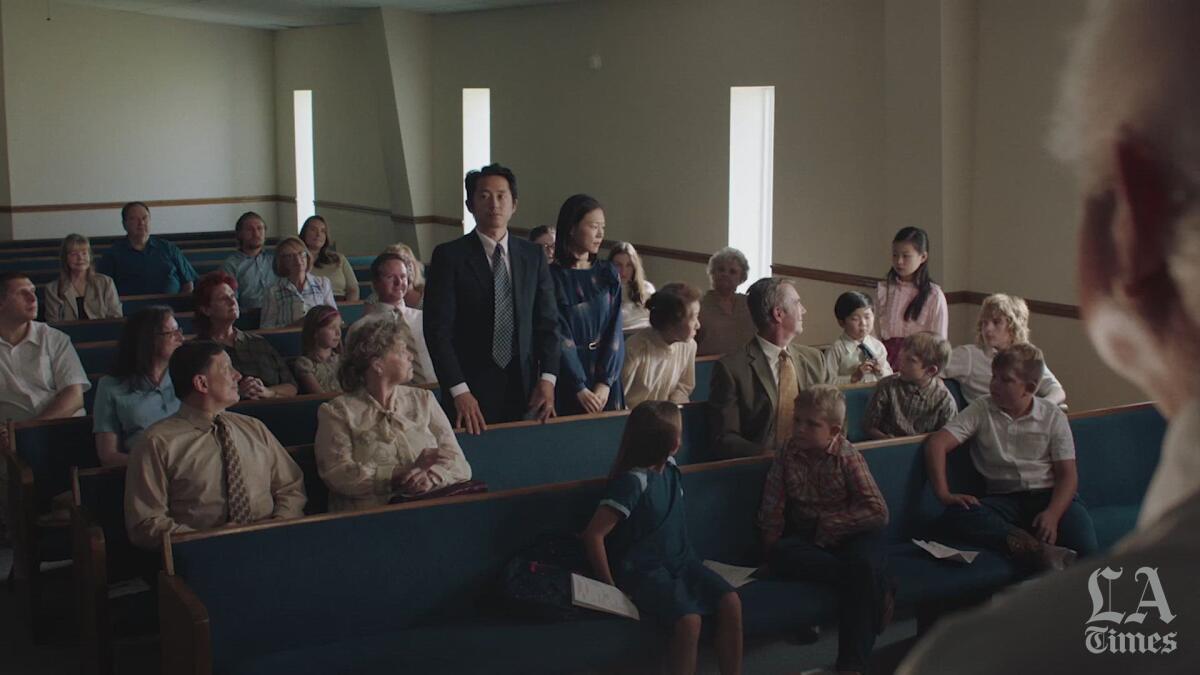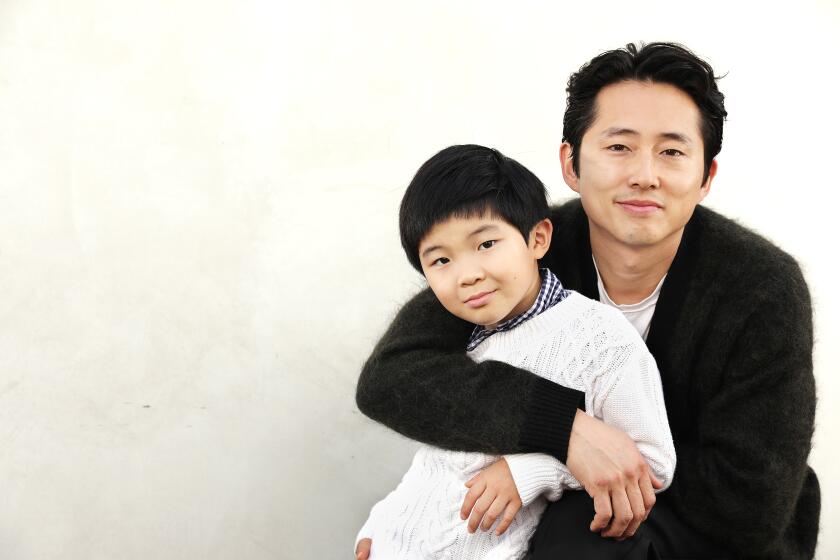Before ‘Minari,’ Lee Isaac Chung made his first film in Rwanda. Here’s how it changed his life
- Share via
Lee Isaac Chung, a dual writing and directing Oscar nominee for “Minari,” remembers submitting his first feature film, “Munyurangabo,” to the 2007 Cannes Film Festival on the day of the deadline. It was the only film festival he submitted to.
He made the 97-minute feature about two boys dealing with the aftermath of the genocide with his students in Rwanda. His wife, Valerie, whom he met at Yale, was volunteering there, training counselors in mental healthcare to help heal community members who had trauma from the war.
For the record:
9:54 a.m. April 23, 2021An earlier version of this story said that when director Lee Isaac Chung met with Creative Artists Agency executives to talk about the style of films he wanted to make, they never invited him back. Chung spoke to CAA agents, not executives. And though the specific agents with whom Chung spoke didn’t call him back, years later Chung did become a CAA client.
Chung, who had been planning to be a physician before pivoting to film, offered to teach a course on filmmaking after hearing that approximately 15 students were interested in learning how to make movies professionally. He designed a curriculum, teaching them the basics of photography and lighting, and planned to make a final film together in the last two weeks of the class.
“I didn’t think of it like I was a director making my first feature film,” he said. “I just wanted to make a really good film as a class exercise.”
He and his students recognized that there weren’t that many Rwandan films at the time, and they wanted to make a film that was for the people. It was the first feature film in the Kinyarwanda language and was shot with locals from Kigali with no acting experience.
Then it got into Cannes.
Chung had filmed “Munyurangabo” on 16mm and didn’t have enough money to strike a digital print, so he bought a projector, let it play on his wall and used a camcorder to record the image on the wall. Then he synced the sound. The film cost $30,000, and once they got into Cannes, he needed to raise an extra $70,000 for a 35mm print, publicist and travel fees.
“It’s ridiculous, now that I think about it,” he said. “And once I got in, I thought everything had changed. I thought, ‘Now I am a serious artist, and it’s all going to be pretty easy from there on out.’”
After the film was invited to play all the film festivals from Toronto to Berlin, Rotterdam to Hollywood’s AFI Fest — where it won the grand prize — Chung was invited to have meetings at Hollywood studios.
As ‘Minari’ becomes an Oscar-nominated movie Monday, get to know the actors and go behind the scenes of the making of the film.
During his meeting at CAA, he remembered telling the agents he wanted to tell stories his way and challenge narrative, like Terrence Malick.
Those agents never invited him back. (Years later, in 2019, Chung did become a CAA client. The agency also reps Malick.)
“At the time I was quite a cinema purist,” he said. “I was a little bit anti-industry, anti-Hollywood.”
His idols were arthouse directors like Jia Zhangke and Hou Hsiao-hsien.
After “Munyurangabo,” Chung made some experimental independent features independently, as well as a documentary about Rwanda called “I Have Seen My Last Born.” That project came about by accident in 2015, when he and frequent collaborator Samuel Gray Anderson were doing research for a post-war action film and realized their video footage could be a documentary in itself.
It wasn’t until Chung’s daughter was born seven years ago, that he started thinking more about what he wanted to leave as his legacy.
“I just imagined her watching my previous films and her being like, ‘I don’t know what you were doing, Dad,’” Chung said, laughing. “‘If this is you being a “purist” or whatever.’”
He said arthouse filmmakers often make films with the anticipation that a lot of people are going to walk out. Because art is meant to challenge, and some viewers don’t get it. They can’t handle it.
“But for me, at one point I was like, ‘Why do I want to make films that people want to walk out of?’” he said. “What if I actually want people to engage and have a good time?”
He said he now respects what people in Hollywood can accomplish.
“I love that they are able to make movies that people want to watch in considerable numbers,” he said. “I think there’s a special art to that, to be able to do that but also be able to slip in meaning into the work.”

For several years in Rwanda in the 2010s, Chung and Anderson’s company Almond Trees Rwanda, the Rwandan outpost for their U.S.-based production company Almond Tree Films, was one of the hubs in the country mentoring local filmmakers.
But Chung also saw firsthand how unhealthy it was for his “Munyurangabo” nonprofessional actors, who had been living on the streets, to suddenly be walking on the red carpet at Cannes, doing press and having people taking their photos.
“It ended up feeling exploitative, even if your intentions are good, because you see the result of it,” he said. “What breaks my heart about it is that they had a certain expectation after Cannes that their lives were going to be luxurious, so it took a long time to just ease them into a career path or something that would create stability in their lives.”
‘Minari’ actress Yuh-Jung Youn on the critically acclaimed family drama from Lee Isaac Chung and her legendary acting career.
Chung still has a community of friends and creatives in Rwanda. He wants to go back and visit, but he’s unsure whether he should be the one to direct another film there.
“It’s always about agency — that’s the goal, always, to give agency to people,” he said. “I think that’s always got to be the priority.”
He said he personally doesn’t take the craft of filmmaking as seriously as he used to.
Instead, he turns his attention on “everything that’s real life. People, relationships, my neighborhood, things like that. That’s much more important.”
Alan Kim was 7 years old when he filmed ‘Minari,’ and now he finds himself in the midst of an awards campaign while going to Zoom school.
More to Read
Only good movies
Get the Indie Focus newsletter, Mark Olsen's weekly guide to the world of cinema.
You may occasionally receive promotional content from the Los Angeles Times.












